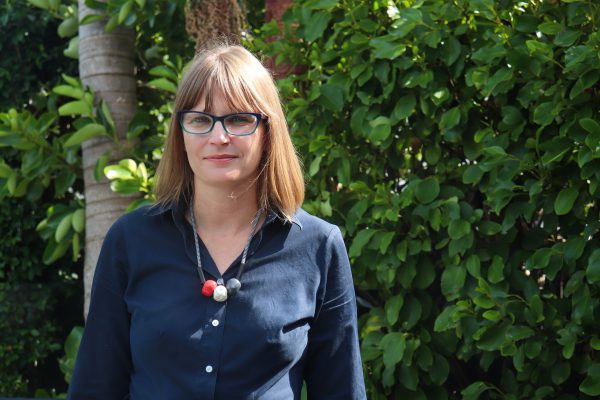OCTOBER 15, 2019 Updated 1 hour ago

Mandy Hager is the author of both fiction and non-fiction, for adults and teens. Her work has won multiple awards and this year she received the Storyline Margaret Mahy Medal for life-time achievement and a distinguished contribution to New Zealand’s literature for young people. Her most recent book, Hindsight: Pivotal moments in New Zealand history, is launched later this month. She has just been appointed as President of the NZ Society of Authors.
A recent Spinoff article (25.9.19) to mark Arts Week headlined a quote from Jacinda Ardern which said: ‘We can’t say we value our art if we don’t value our artists.’ This opinion piece from the PM states that, ‘as someone who is passionate about the arts and the role they play in our communities,’ she believes art is all about wellbeing. ‘Being able to create and access art contributes not only to our individual wellbeing, but is also an important factor in the wellbeing of our communities, and our society as a whole.’
For anyone working in the arts, this sentiment is very welcome, especially from our Prime Minister, whose predecessor, John Key, said at the launch of the Literary heritage Trail in 2012: ‘while our literary heroes may never challenge the glory and respect given to our All Blacks, we still need role models to inspire us’ and who described our most recent Booker Prize winner, Eleanor Catton, as a ‘fictional writer.’
In the Spinoff article, Ms Ardern points to several good initiatives currently being undertaken to support sustainable careers in the arts, saying ‘creative industries, and the artists that work in them, already make a significant contribution to our economy, and our government is committed to supporting this growth . . . However, we cannot say we value our art if we do not value our artists. We know our artists are often marginalised. Recent data confirms that our artists’ average earnings are well below the New Zealand average, and even the most talented and resilient can find it challenging to establish a sustainable career . . . all New Zealand workers deserve a fair wage, because this government is focused on wellbeing, and because I believe in the power of art to make change.’
It’s refreshing to hear someone championing the arts at such a high level but, unfortunately, on the ground, NZ writers are grappling with several serious issues that may have gained a sympathetic ear but little traction to date. These issues very much affect our wellbeing and our ability to achieve a sustainable career; in fact, I’d go as far as to say they currently breach our human rights under the Berne Convention and the International Covenant on Economic, Social and Cultural Rights (ICESCR). New Zealand is a signatory to both.
Our sister organisation, Copyright Licensing NZ (CLNZ), recently conducted a survey of writers that discovered, on average, writers earn around $15,200 per annum from their writing — below the minimum wage for a 40 hour week (approx. $20,000) and substantially less than a living wage (approx. $44,000). Just over half cited the need for further support from partners and/or relied on other employment to pay the bills (42% in jobs unrelated to writing.) This information comes at a time when failing youth and adult literacy is a hot topic — and funding for literature through Creative New Zealand appears to be falling. The 2020-2022 CNZ investment client funding for literature equals 2.09% of the total funding pool (3 years of funding at $4.1m from a pool of $198.8m), compared to, say, 4.83% in 2019, or visual arts, at 5.57%.
The NZSA and CLNZ, with support from the Publishers Association of NZ (PANZ), are currently advocating on behalf of all writers, whether members of NZSA or not, to protect their creative copyright and their right to receive fair payment for their creative outputs. These issues roughly fall into two main categories.
Public Lending Rights (PLR) and Educational Lending Rights (ELR): For several years now we’ve been lobbying to effect an increase in the Public Lending Right (which compensates authors for the free dissemination of books through public libraries.) The fund has not been increased for over a decade and doesn’t include digital or audio book borrowing. This stagnation means that the real-life value of these payments has reduced over time. Dame Fiona Kidman has done some excellent analysis on this and notes in New Zealand Author ‘As a personal example . . . I received nearly 25 percent more in actual dollars 20 years ago than I do now, even though I have written 10 more books.’
First introduced after lobbying by NZSA in 2008, which built on the previous Authors’ Fund (instigated after petitioning by NZSA/PEN in 1973), the fund is divided among registered authors, based on how many copies of their works are estimated to be held by public libraries. The book rate was $3.61 in 2018, yet if the amount in the fund had kept pace with inflation (rather than being held static at $2m) there would have been a further $300,000 in the fund by the end of 2017, and the most recent book rate would have risen to $4.57 per book per year. For authors with several titles in circulation, this would make a big difference.
Other changes are also necessary to the PLR, to truly make it fair. Currently, the law does not allow for a PLR payment for the use of digital and audio books in public libraries (now 30% of lending), nor does it require private libraries such as the Blind Foundation ( which lends 560,000 books per year) to be included in the figures. The fund has not kept up with technological advances and readers’ new preferences, plus excludes many who now self-publish.
In addition, unlike Australia, New Zealand authors receive no Educational Lending Rights compensation for use of their works in the education sector. ELR would compensate authors for the use of books in school, classroom and other institutional libraries. Our current system, therefore, disincentivises authors and illustrators to create further work and affects their potential income. This problem is further exacerbated by the fact that only 70% of schools currently buy licences to reproduce work (issued through the CLNZ), despite current copyright legislation. This means 30% of schools are not paying to copy work they use for teaching in the classroom on a daily basis. We recommend an annual copyright licence should be a cost of business like any other compliance and made compulsory for schools, with the MOE applying the regulation across the board.
The Copyright Act Review and the Marrakesh Treaty Amendment Bill: Our government’s recent decision to join the Marrakesh Treaty, designed to facilitate access to published works for persons who are blind, visually impaired or otherwise print disabled, is also hugely problematic for authors. While I personally, and NZSA/CLNZ as organisations, fully support the broadening of definitions in order to support our disabled community, no acknowledgement or mechanisms have been put in place to compensate writers for the free dissemination of their content, despite the ICESCR (which, remember, we’re signatories to) stating ‘All peoples may, for their own ends, freely dispose of their natural wealth and resources without prejudice to any obligations arising out of international economic co-operation, based upon the principle of mutual benefit, and international law. In no case may a people be deprived of its own means of subsistence.’
This broadening out of definitions means that up to 24% of our population (those who identified as having some disability in the last census) would now be eligible for free books under the Treaty — up from 100k people to 400k. This will almost undoubtedly damage potential sales, in an environment where even those traditionally published are lucky for print runs of over 2,000 copies (and many much smaller.) Writers already give their work away to the universities (who are licenced) and the Blind Foundation, and to the 30% of schools currently without a Copyright Licence. On the face of it, the new exemptions the government is introducing to support the disabled, through the Marrakesh Amendment Bill, will also expand those entities that can copy work from the current two entities to over 3000, as it includes all schools and libraries. NZSA believes this is in breach of the Berne Convention, which requires that: the free use of the work under copyright exemptions will not affect the ability of the author to sell the work. It seems that everyone in the value chain of book publishing, from making accessible formats to end user, gets paid — e.g. for recording the book, or with paid salaries — except for the author.
Paula Browning, (CEO of CLNZ) points out that, although current NZ copyright law gives exclusive rights to the author of a literary work (‘literary’ meaning any written words, fiction, non-fiction, poetry, journal articles etc.) there is a little-known but extensive section of the Copyright Act (Part Three) that covers ‘fair’ dealing. This encompasses everything from provision of creative work for criticism, review and news reporting, to research and private study. Copying by educational institutions, examinations, libraries and archives and for public administration, reformatting for the print disabled and certain activities undertaken by Internet Service providers are also nested in here.
Browning illustrates the problems here using an analogy to the wine industry i.e. the government wouldn’t talk to wine drinkers about regulation that matters to the wine industry, so why are they only speaking to content users when it comes to NZ copyright? ‘They should have been talking with authors! . . . Wine is generally sold in cases of 12 bottles. If a case of wine equals a non-fiction book and every copyright extension is a bottle that’s given away for free to someone who isn’t the winemaker, you may have only half the bottles left to sell after all the exceptions that copyright legislation says others get to have. The value of your original work is diminished even before you sold one copy!’
No other creative industry has to give their own content away by government order without compensation. Would Karen Walker be happy to give away 24% of her designer clothing for free? Would Peter Jackson be happy allowing 24% of his creative work to be streamed for free? He, of course, could call in the big gun lawyers to stake his claim. But for any organisation to challenge these exceptions they must take a claim to the High Court and expect to pay anywhere from $50,000 to $100,000 just in fees.
NZSA has a current membership approaching 1600 (up from 1300 a couple of years back), who pay an annual membership fee of $125 for full membership. Our resources are already stretched, with a wealth of programmes to support writers. As it is, along with our partners, our CEO and Board have produced submissions on all these changes, writing to every MP, including Jacinda Ardern, and have spoken three times with Kris Faafoi, as well as Tracey Martin and Chloe Swarbrick. They’ve submitted to the select committee, written media releases, engaged with local Auckland politicians, and have two permanent representatives on the PLR advisory committee — all, so far, to no avail.
We’ll continue to lobby at the highest levels to improve the earning potential of all NZ writers and protect their content, whether members of NZSA or not. But the more members we have, the more lobbying power we bring to the table. For the price of less than half a cup of coffee a week, increased support of the NZSA could help us break down the barriers to a sustainable writing career.
READINGROOM
https://www.newsroom.co.nz/@readingroom/2019/10/15/855752/is-jacinda-ardern-doing-anything




